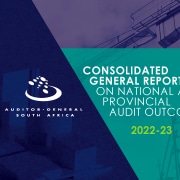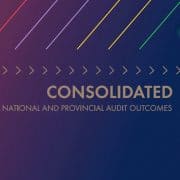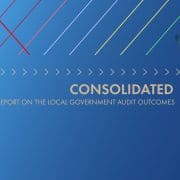|
Getting your Trinity Audio player ready...
|
In part one of our mini-series we looked at some of the municipal audit outcomes for 2016-2017 – many of which were dismal. Despite the Office of the Auditor-General (AG) having the powers to scrutinise and audit the books of municipalities and public entities, it currently has no power to impose meaningful sanctions or penalties – a situation that has caused immense frustration for auditor-general Kimi Makwetu.
There are legislative changes in progress, though, that will ensure the AG’s ability to hold municipal culprits accountable, arising out of a resolution taken in October 2017 by the Standing Committee on the Auditor-General to amend the Public Audit Act (PAA).
The PAA gives effect to the provisions of the Constitution establishing and assigning functions to an Auditor-General institution, and provides for the auditing of institutions in the public sector, among others.
The proposed PAA amendments will put the teeth in the AG’s mouth, as it were. The PAA amendment bill was unanimously approved by all parties in the National Assembly on 29 May, and now sits with the National Council of Provinces for concurrence.
“We believe the continued mismanagement of taxpayers’ money can be stopped and will be stopped,” said Vincent Smith, chairperson of the AG standing committee.
He said that municipalities, state-owned entities and government departments would no longer be able to ignore the findings of the AG. “The Public Finance Management Act is clear on the financial responsibilities of accounting officers, but there has not been a single conviction regarding contraventions of the law,” Smith said.
Because remedial action recommended by the AG would be binding, the entity would be able to take steps to recover money lost to corruption and mismanagement. The AG would be able to issue a debt certificate to accounting officers or authorities who do not implement the recommended remedial action and recover losses from the person responsible – in these cases the officer or authority would have to repay the amount specified in the debt certificate. The AG will report the issuance of these debt certificates to the Speaker of the National Assembly, so that the relevant portfolio committee could ensure accountability.
The AG would also now have the powers to refer cases of corruption to appropriate investigative bodies such as the Hawks, the police, the Special Investigating Unit and the Public Protector, which will have to report back to the AG on their progress.
No more impunity
During a parliamentary meeting of the committee in March 2018, Makwetu noted that the PAA was promulgated 14 years ago, while the Public Finance Management Act (PFMA) is 15 years old and the Municipal Finance Management Act (MFMA) is 19 years old. The years have shown that these instruments had not been effective in ensuring sound financial management and in fact, reports from the 2008/2009 to 2016/2017 financial years, in local, provincial and national government, showed an overall trend of undesirable audit conclusions.
The reason for the increasing non-compliance and irregular expenditure was as a result of no consequences for the perpetrators – a view that many agree with.
“The proposed amendments to the Public Audit Act will ensure that dishonest and corrupt public officials are held accountable,” said FF Plus parliamentary spokesperson on finance, Wouter Wessels in a statement. “Until now, a lack of accountability has been a major cause of fraud, corruption and misappropriation at public institutions.”
Wessels said the amendment bill is a positive step towards effective combating of financial mismanagement. One of the most important amendments concerns the definition of ‘irregularities’, which now means ‘non-compliance with or the violation of a law, fraud, theft or neglecting to do a legal duty which may lead to financial loss, loss of resources, damage to public institutions or damage to the general public’.
“This definition can also be used to describe what is wrong with most of our country’s municipalities,” said Wessels. He added that if the PFMA and MFMA were properly enforced, there would have been no need for amendments to the PAA – but because there is no political will for enforcement, it falls to the AG to impose sanctions on offenders.
“The amendment bill is not an achievement, but an accusation against the ANC who stood by and watched as laws were not complied with. There were also no consequences to bear for the non-compliance. It has caused fruitless and wasteful expenditure as well as corruption to become the norm.”








